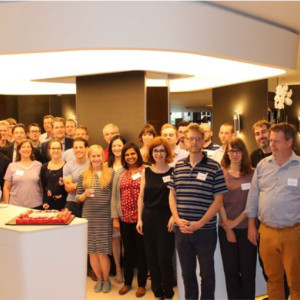 \
&
Contact us
\
&
Contact us
 \
&
Contact us
\
&
Contact us
Published on | 1 year ago
Last updated on | 5 months ago

marie.timmermann@fwo.be
For all actions under the Digital Europe programme the use of eligible costs based on unit costs is authorised for staff costs and costs for internally invoiced goods and services.
For some beneficiaries, staff costs can be more easily declared on the basis of their own usual cost accounting practices (so-called ‘average personnel costs’) because they have already developed unit costs which they use in other situations when declaring costs. The payment of the unit costs will be based the amount of time worked on the action.
‘Internally invoiced goods and services”’ means goods or services which are provided within the beneficiary’s organisation directly for the action and which a beneficiary values on the basis of its usual cost accounting practices. They may include (amongst others):
The payment of the unit costs will be the number of units used, provided or produced for the action.
For both staff costs and internally invoiced goods and services the beneficiary must maintain proof which can be verified ex post by the Commission during checks and audits. Eligible costs will be reimbursed taking into account the relevant funding rate of the programme. Absence of double funding will be ensured because the usual cost accounting practices of the beneficiary must comply with the requirement that eligible costs are counted only once in the calculation of the unit costs. This can be checked ex post by the Commission during checks and audits. The Commission will also check that the beneficiary concerned has not received another EU grant for the same action.
The method to determine the amount of unit costs is the usual cost accounting practices of the beneficiary, in accordance with article 181(4)(c)(ii) of the Financial Regulation.
To be considered as usual cost accounting practices, the method for calculating the unit costs should comply with the following:
More information can be found in the Decision authorising the use of unit costs based on usual cost accounting practices for actions under the Digital Europe programme.
Please note that the rules are different for Horizon Europe. For more information on cost declaration in Horizon Europe, please visit our Horizon Europe Legal & Financial Assistance page.
We offer news and event updates, covering all domains and topics of Horizon Europe, Digital Europe & EDF (and occasionally, for ongoing projects, Horizon 2020).
Stay informed about what matters to you.
By signing up, you can opt in for e-mail notifications and get access to
a personalised dashboard that groups all news updates and event announcements in your domain(s).
Only for stakeholders located in Flanders

Circusol is an Innovation Action project funded under a cross-cutting work programme part of Horizon 2020. Circusol aims at unleashing the full potential of circular business models, in particular Product-Service Systems, in simultaneously delivering real environmental, economic and user benefits. By that, Circusol aims to establish solar power as a spearhead sector in demonstrating a path driven by service-based businesses towards a circular economy in Europe.
A strong Flemish partnership in new Horizon 2020 project on circular economy business demonstrators, including VITO (Coordinator), IMEC, Ecopower cvba, Futech bvba, PV Cycle aisbl and Daidalos Peutz bvba.